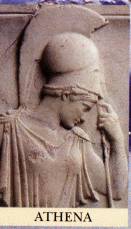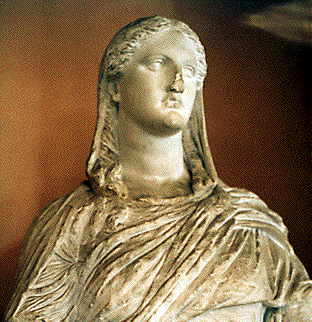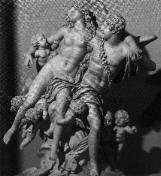 |
Xenatrek's HomePage Xena and Gabrielle Tribute FanPage |
 |
 |
Xenatrek's HomePage Xena and Gabrielle Tribute FanPage |
 |
Olymp | Asgard | Nirwana
Birth Of Gods | Description Of Gods
 |
Zeus - god of heavens and earth, ruler god. Zeus was an amorous god. His first mate was probably Dione, but his official consort was his sister, Hera, who bore him Ares and Hebe. Zeus also loved Themis, Eurynome, Demeter, Mnemosyne, Leto, and Maia and fathered many gods. Famous among his mortal loves were Danaë, Leda, Semele, Thetis, Io, and Europa. His sons sired from mortal wives include Hercules, Dardanus, and Amphitryon. He was also the father of Athena, who was said to have sprung from his head. Zeus, ruling from his court on Mt. Olympus, was the symbol of power, rule, and law. As the father god and the upholder of morality, he rewarded the good and punished the evil. The most famous weapon of Zeus was the thunderbolt, but, according to some legends, he also possessed the aegis. The Romans equated Zeus with their own supreme god, Jupiter (or Jove). |
 |
Hera - goddess of marriage, queen of the Olympian gods, daughter of Kronos and Rhea. She was the wife and sister of Zeus and the mother of Ares and Hephaestus (born in parthogenesis). A jealous wife, she fought constantly with Zeus and plagued his mistresses and children. She was the protectress of women, presiding over marriage and childbirth, and frequently punished offending husbands. A powerful divinity, Hera was worshiped in all parts of Greece, especially at Argos and Salmos, where she had splendid temples. Frequently she is associated with the pomegranate, symbol of marital love and fruitfulness. The peacock was sacred to her. The Romans identified Hera with Juno. |
 |
Ares - god of war. He is considered murderous and bloodstained but also a coward. He was not a favourite god in greece but in Thrakien and Skythien. He has an affair with Aphrodite and produced four childs with her. Ares killed Halirrhothios, son of Poseidon, when the youth violated his daughter, Alcippe. For this crime Ares was judged by a tribunal of the 12 Olympians and acquitted. The hill on which the trial took place, the Areopagus, was named for him. The worship of Ares was not as important as that of Mars, with whom he was identified by the Romans. |

|
Aphrodite - goddess of love and beauty. Homer designated her the child of Zeus and Dione. Hesiod's account of her birth is more popular: she supposedly rose from the foam of the sea where Uranus' genitals had fallen after he had been mutilated by Kronos. Aphrodite was married to Hephaestus. She loved Ares, by whom she bore Harmonia and, in some myths, Eros and Anteros. She was the mother of Hermaphroditus by Hermes and of Priapus by Dionysus. Zeus caused her to love the shepherd Anchises, by whom she bore Aeneas. Adonis, in whose legend Aphrodite appears as a goddess of fertility, also won her favors. It was to Aphrodite that Paris awarded the apple of discord, which caused the dispute leading ultimately to the Trojan War. Worshiped throughout Greece, she was the goddess of love, marriage, and family life; she was also worshiped as a war goddess, as at Sparta, and as a sea goddess and patroness of sailors. The Romans identified Aphrodite with Venus. |
 |
Athene - goddess of wisdom and war. According to myth, after Zeus seduced Metis he learned that any son she bore would overthrow him, so he swallowed her alive. Later Hephaestus split Zeus' skull with an ax, and out sprang Athena, fully armed. Athena was a deity of diverse functions and attributes. Her most conspicuous role was perhaps that of a goddess of war, the female counterpart of Ares. However, she was also a goddess of peace, noted for her compassion and generosity. Like Minerva, with whom the Romans identified her, she was a patron of the arts and crafts, especially spinning and weaving. In later times she was important as a goddess of wisdom. Athena was also a guardian of cities, notably Athens, where the Parthenon was erected as her temple. |
 |
Artemis - goddess of the moon, hunt and maiden. Olympian goddess, daughter of Zeus and Leto and twin sister of Apollo. Artemis' early worship, especially at Ephesus, identified her as an earth goddess, similar to Astarte. In later legend, however, she was primarily a virgin huntress, goddess of wildlife and patroness of hunters. Of the many animals sacred to her, the bear was most important. Artemis valued her chastity so highly that she took terrible measures against anyone who even slightly threatened her (e.g., Actaeon). She was attended by nymphs, whose virginity she guarded as jealously as her own. She was also an important goddess in the life of women, concerned with marriage and with the young of all creatures. As the complement to Apollo, she was often considered a moon goddess and as such was identified with Selene and Hecate. In ancient Greece, the worship of Artemis was widespread. The Romans identified her with Diana. She is mentioned in the biblical book of Acts of the Apostles, where she appears to be in competition with the god of the Christians. |
 |
Apollon - one of the most important Olympian gods, concerned especially with prophecy, medicine, music and poetry, archery, and various bucolic arts, particularly the care of flocks and herds. He was also frequently associated with the higher developments of civilization, such as law, philosophy, and the arts. As patron of music and poetry he was often connected with the Muses. Apollo was the father of Aristaeus, Asclepius, and, in some legends, Orpheus, although his amorous affairs were not particularly successful. Daphne turned into a laurel rather than submit to him, and Marpessa refused him in favor of a mortal. He gave Cassandra the gift of prophecy, and when she disappointed him, he decreed that no one would believe her prophecies. In Roman religion, Apollo was worshiped in various forms, most significantly as a god of healing and of prophecy. |
 |
Hephaestus - god of forge and fire. Olympian god. According to Homer he was the son of Hera and Zeus, but Hesiod states that he was conceived and borne by Hera alone. Originally an Asian fire god, in Greece he became the divine smith and god of craftsmen. He was worshiped primarily in cities such as Athens, where he had a temple. It was said that he was either born lame or was lamed by Zeus, who threw him down from Olympus when Hephaestus took Hera's side in a dispute. At huge furnaces, worked by Cyclopes, he fashioned ornaments, weapons, and magical contrivances for the gods and heroes (e.g., Achilles' shield). Most scholars agree that he was the husband of Aphrodite, who was unfaithful to him. The Romans identified Hephaestus with Vulcan. |
 |
Hermes - messenger-god. His functions were many, but he was primarily the messenger of the gods, particularly of Zeus, and conductor of souls to Hades. He was god of travelers and roads, of luck, of music and eloquence, of merchants and commerce, of young men, and of cheats and thieves. He was credited with having invented the lyre and the shepherd's flute. His most typical monument, the herma or herm, was a stone pillar which usually had a carved head on top and a phallus in the center, probably representing the god in his original role as the giver of fertility. The Romans identified Hermes with Mercury. |
 |
Demeter - goddess of harvest and fertility; daughter of Kronos and Rhea. She was the mother of Persephone by Zeus. When Hades abducted Persephone, Demeter grieved so inconsolably that the earth became barren through her neglect. Searching for her daughter, she wandered to Eleusis, where the Eleusinian Mysteries were inaugurated in her honor. She revealed to Triptolemus, an Eleusinian, the art of growing and using corn. The Romans identified her with Ceres.. |
 |
Dionysos or Bacchus - god of fertility and wine. Legends concerning him are profuse and contradictory. However, he was one of the most important gods of the Greeks and was associated with various religious cults. According to the Orphic legend, he was Dionysus Zagreus, the son of Zeus and Persephone; in other legends he was the son of Zeus and Semele and was reared by the nymphs on Mt. Nysa, where he invented the art of wine making. His characteristic worship was ecstatic and women were prominently involved. Votaries, through music, dancing, and drinking, and through eating flesh and blood of sacrificial animals, attempted to merge their identities with nature. The Romans identified him with Liber and with Bacchus, who was more properly the god of wine. |
 |
Poseidon - god of the sea and earthquakes, protector of all waters. After the fall of the Titans, Poseidon was allotted the sea. He was worshiped especially in connection with navigation; but as the god of fresh waters he also was worshiped as a fertility god. In Thessaly and other areas he was important as Hippios, god of horses, and was the father of Pegasus. Poseidon was represented as extremely powerful, with a violent and vengeful disposition. He carried the trident, with which he could split boulders and cause earthquakes. He was the husband of Amphitrite, who bore him Triton, and by others he fathered many more sons, who usually turned out to be strong, brutal men (like Orion) or monsters (like Polyphemus). The Romans identified him with Neptune. |
 |
Hades - god of the underworld. Brother of Zeus. Married with Persephone. Unauthorized spirits who tried to enter or leave Hades underworld were challenged by the fearful dog Cerberus. All the dead drank of the river of forgetfulness. The judges of the dead-Minos, Aeacus, and Rhadamanthus-assigned to each soul its appropriate abode. The virtuous and the heroic were rewarded in the Elysian fields; wrongdoers were sent to Tartarus; and most wandered as dull shadows among fields of asphodel. |
 |
Eros - god of love. He was the personification of love in all its manifestations, including physical passion at its strongest, tender, romantic love, and playful, sportive love. According to some legends he was one of the oldest of the gods, born from Chaos and personifying creative power and harmony. In most legends he was the son of Aphrodite and Ares and was represented as a winged youth armed with bow and arrows. At Thespiae and at Athens he was worshiped as a god of fertility. In Hellenistic and Roman myth, he was represented as a naked, winged child, the son and companion of Venus. To the Romans he was Cupid, or Amor. |
 |
Persephone - goddess of fertility and queen of the underworld. When she was still a beautiful maiden, Hades seized her and held her captive in his underworld. Though Demeter eventually persuaded the gods to let her daughter return to her, Persephone was required to remain in the underworld for four months because Hades had tricked her into eating a pomegranate (food of the dead) there. When Persephone left the earth, the flowers withered and the grain died, but when she returned, life blossomed anew. |
| Fates - three goddesses who controlled human lives; also called the Moerae or Moirai. They were: Clotho, who spun the web of life; Lachesis, who measured its length; and Atropos, who cut it. | |
| Furies also Erinyen - powerful divinities that personified conscience and punished crimes against kindred blood, especially matricide. They were usually represented as winged women with serpent hair. Their names were Megaera [jealous], Tisiphone [blood avenger], and Alecto [unceasing in pursuit]. When called upon to act, they hounded their victims until they died in a "furor of madness or torment. |
Design and Layout by Gabriele | Copyright 2004 - 2026 | 13:14 Uhr